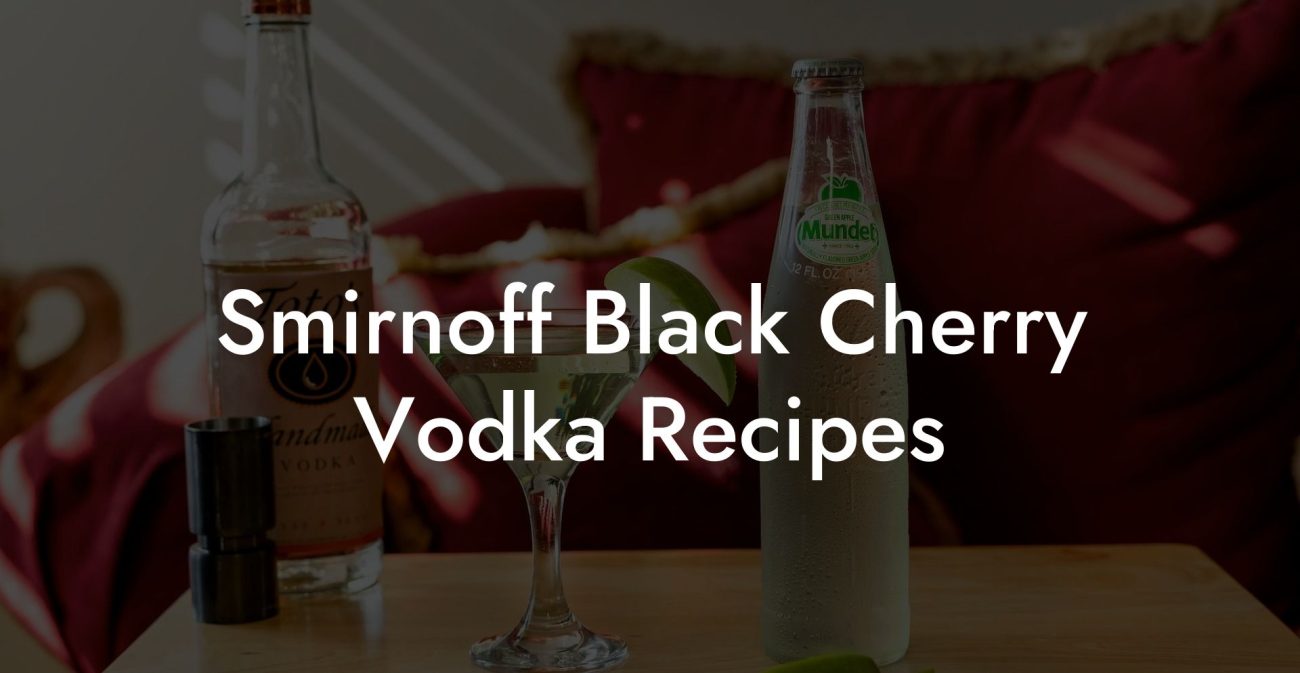Vodka cocktails are the rockstars of the beverage world—sleek, versatile, and ever-ready to elevate any party vibe or chill session with friends. Whether you’re a cocktail rookie or a seasoned mixologist, prepare to dive into a world of flavor, creativity, and a dash of cheeky humor. Here, we’re breaking down everything you need to know about vodka cocktails, from timeless classics to quirky modern twists that resonate with today’s millennial and Gen Z palates.
Vodka Cocktails Table of Contents
The Rise of Vodka Cocktails: A Spirited History
Classics That Stood the Test of Time
Modern Vodka Cocktails: The New Age of Mixology
The Art of DIY Mixology: Crafting Your Perfect Vodka Cocktail
Vodka Cocktails on a Budget: High-Flavor Without the High Price
Seasonal Sensations: Vodka Cocktails All Year Round
Celebratory Sips: Vodka Cocktails for Every Occasion
The Science Behind the Spirit: Why Vodka Wins the Mixology Game
Vodka Cocktails and Pop Culture: From Bars to Social Media Sensations
Mixology 101: Advanced Tips for the Aspiring Vodka Connoisseur
Resources and Community Support: Your Next Steps in Mixology Mastery
Embracing Your Unique Cocktail Journey
FAQ About Vodka Cocktails: Your Burning Questions Answered
Your Journey to Vodka Cocktail Mastery
Looking For The Best Vodka? You'll Love These Vodka Guides...
The Rise of Vodka Cocktails: A Spirited History
Vodka’s evolution from a humble grain-based spirit in Eastern Europe to the undisputed foundation of some of the most iconic cocktails around the globe is nothing short of epic. Historically known for its neutral flavor and smooth finish, vodka quickly became the perfect base for creative mixologists looking to experiment with bold flavors and unexpected ingredients.
In the mid-20th century, vodka exploded onto the global scene, thanks in large part to Hollywood glamour and a growing trend for sophisticated, yet accessible, party drinks. From Moscow Mules with their refreshing ginger kick to the ultra-glam Cosmopolitan favored on TV screens across the world, vodka cocktails became synonymous with a chic, modern lifestyle.
Today, vodka cocktails are more than just mixed drinks—they’re a cultural phenomenon. They embody the spirit of innovation and inclusivity, offering a blank canvas for bartenders and enthusiasts alike to craft beverages that echo the lively, unpredictable nature of today's social scenes.
Classics That Stood the Test of Time
If you can’t go wrong with a tried-and-true recipe, cultural impact, and a touch of elegance, then these classic vodka cocktails are right up your alley. They’re the foundation of modern mixology, each with a story, a vibe, and of course, a killer taste.
The Cosmopolitan
The Cosmopolitan isn’t just a drink—it’s practically a lifestyle. With its vibrant pink hue and perfectly balanced blend of vodka, triple sec, cranberry juice, and a squeeze of lime, it became an icon of the 90s and found its way back into the hearts of cocktail lovers after a major TV reboot. Modern spin-offs might add a burst of exotic fruit or customize the rim with a zesty twist, making it a playground for creative cocktail enthusiasts.
Best Budget Vodkas Ranked
Vodka Martini
A nod to James Bond’s taste in espionage and martini perfection, the Vodka Martini is the go-to for those who like their drinks neat, crisp, and undeniably cool. Whether shaken or stirred, de rigueur or with a twist of lemon, this cocktail represents the epitome of simplicity and sophistication. Its minimalist charm provides an open canvas for aspiring mixologists to experiment with flavored vodkas or artisanal garnishes.
Bloody Mary
The Bloody Mary is essentially the superhero of brunch. Combining vodka with savory tomato juice and a secret mix of spices and flavorings (think horseradish, Worcestershire sauce, and a hint of lemon), it transforms a sleepy morning into a vibrant celebration. Customize it with a celery stick, pickles, olives, or even bacon—yes, bacon is a thing—and you’ve got a breakfast cocktail that says, “Good morning, world!”
These classics continue to inspire bartenders and home enthusiasts alike, offering a solid foundation upon which you can build your own cocktail masterpieces.
Modern Vodka Cocktails: The New Age of Mixology
In a world where trends change as swiftly as swipe-lefts and swipe-rights, modern vodka cocktails have stepped up to the plate with a mix of innovation and authenticity. These drinks are all about customization, experimentation, and a little bit of that unexpected twist that leaves you grinning.
Flavored Infusions and Artisanal Craft
Gone are the days when vodka was just a neutral player. Today’s mixologists enjoy infusing their vodka with flavors like cucumber, basil, or even spicy jalapeño. The resulting infusions not only add depth to the spirit but also set the stage for cocktails that burst with flavor. Picture a cucumber basil vodka fizz on a hot summer day or a spicy infusion that kicks your taste buds into high gear—these innovative twists speak directly to the adventurer in you.
Sustainable Sips
Sustainability is more than just a buzzword; it’s a lifestyle, and the cocktail world is right on board. Modern vodka cocktails often emphasize locally sourced ingredients, eco-friendly distilling practices, and zero-waste garnishes. For instance, a twist on a classic mule might feature organic ginger beer and garnishes made from locally harvested herbs, creating a beverage that not only tastes good but also feels good knowing you’re contributing to a greener planet.
Health-Conscious Creations
With a surge in health awareness among millennials and Gen Z, vodka cocktails are shedding their “guilty pleasure” reputation to become smarter choices. Think low-calorie mixers, natural sweeteners like agave or stevia, and fresh, whole ingredients that transform your drink into a revitalizing experience. Some bars have even rolled out cocktails that are rich in antioxidants and vitamins, proving that indulgence can have a healthy twist.
These modern iterations not only cater to a more diverse palate but also reflect today's values—creativity, environmental consciousness, and a commitment to well-being.
The Art of DIY Mixology: Crafting Your Perfect Vodka Cocktail
There’s an undeniable thrill in creating your own concoctions at home. Whether you’re shaking up a batch for a themed party or simply experimenting on a lazy weekend, DIY mixology is where personalization meets creativity. Pull out your cocktail shaker, gather your favorite ingredients, and let’s craft something exciting together.
Essential Tools and Ingredients
Making great vodka cocktails starts with having the right tools. Here’s your quick checklist:
- Shaker: A sturdy Boston shaker or cobbler shaker will do the trick.
- Jigger: For precise measurements (because balance is key).
- Muddler: Essential for crushing fresh herbs or fruits.
- Strainer: To ensure that only the smoothest liquid makes it to your glass.
- Glassware: From martini glasses to mason jars, choose what suits your vibe.
Don’t forget your quality vodka—whether you prefer a classic, unflavored vodka or something with a twist, the spirit you choose lays the foundation for your cocktail’s flavor profile.
Step-by-Step: Crafting the Ultimate Vodka Mule
The Vodka Mule is a canvas for creativity, combining the zesty kick of ginger beer with the smooth neutrality of vodka. Here’s a straightforward recipe to get you started:
- Fill: Start by filling your copper mug (or your favorite glass) with ice.
- Pour: Add 2 ounces of your favorite vodka.
- Mix: Squeeze in the juice of half a lime—the tangy acidity is vital.
- Add: Top off with ginger beer to fill the mug, watching as the bubbles create a mesmerizing dance.
- Stir: Give it a gentle stir to blend the flavors.
- Garnish: Top with a lime wheel or sprig of mint for that extra pop of freshness.
Feel free to experiment—maybe a splash of elderflower cordial or a pinch of fresh grated ginger will make it uniquely yours.
Exploring Flavor Pairings
One of the joys of mixology is discovering unexpected flavor combinations that simply work. Vodka’s neutral profile means it can mingle with nearly any flavor:
- Berries: Raspberries, blueberries, and strawberries add a tangy sweetness.
- Citrus: Lemon, lime, and even grapefruit provide a crisp, refreshing zing.
- Herbs: Mint, basil, and rosemary can be muddled into your mix for a fragrant twist.
- Spices: A dash of cinnamon or a hint of cardamom during winter can transform your cocktail into a warming delight.
- Tropical Touches: Pineapple, coconut water, or a splash of passion fruit juice transport you straight to a beachy paradise.
Experimenting with these combinations will help you find the perfect balance that suits not just your taste but also the mood of your next get-together.
Vodka Cocktails on a Budget: High-Flavor Without the High Price
Not everyone wants to make a huge investment every time they experiment with their cocktail recipes, and that’s totally cool. Crafting amazing vodka cocktails on a budget is all about smart choices and a splash of creativity.
The secret is focusing on versatile ingredients that can be used in multiple recipes. A good quality, mid-range vodka, fresh local lemons and limes, and a couple of seasonal fruits or herbs can go a long way. Look for sales, shop at local markets, or even trade ingredients with friends to keep your cocktail game strong without burning a hole in your wallet.
Plus, remember that sometimes less is more—a simple cocktail with a few well-chosen ingredients can be far more delightful than an overcomplicated mix requiring a cabinet full of obscure ingredients. The best part? You get to enjoy the satisfaction of creating something awesome on a budget, and that kind of success tastes even sweeter.
Seasonal Sensations: Vodka Cocktails All Year Round
Every season brings its own unique flavors and inspirations for vodka cocktails. Whether you're looking to cool off during a sweltering summer bar-hopping adventure or cozy up with a warm, spiced beverage in the winter, there’s a cocktail to fit every mood.
Summer Refreshers
When the sun is at its peak, your vodka cocktails should be light, refreshing, and bursting with summery vibes. Think sparkling vodka lemonades, infusions of watermelon and mint, or a highball dressed with tropical fruit juices. These cocktails not only quench your thirst but also keep you in a breezy, laid-back mood—perfect for rooftop parties and beach days.
Autumnal Warmers
As the leaves change color, so too does your cocktail repertoire. Embrace flavors like apple, cinnamon, and even a hint of clove to evoke the warmth of fall. An autumn-inspired vodka cocktail might showcase a blend of fresh apple cider and vodka, finished with a cinnamon stick garnish. It’s like bringing a taste of the harvest season straight to your glass.
Winter Wonders
Winter calls for a cocktail that warms you from the inside out. Imagine a spicy vodka cocktail featuring notes of ginger, a dash of nutmeg, and perhaps a drizzle of local honey. Serve this up in a mug, and you’ve got the perfect companion for chilly nights, festive gatherings, and those moments when a little extra coziness is needed.
Spring Fling
Fresh, floral, and bursting with life—spring is nature’s rebirth, and your cocktails should echo that sentiment. Incorporate fresh berries, lavender, and lemon verbena into your vodka drinks to create a burst of flavor that perfectly mirrors the season’s rejuvenating energy.
Celebratory Sips: Vodka Cocktails for Every Occasion
Vodka cocktails aren’t just for relaxing at home—they’re the life of any celebration. Whether it’s a chic cocktail party, a casual movie night, or a festive holiday gathering, there’s a vodka drink that complements every event.
For those milestone moments like birthdays or promotions, consider a signature cocktail that guests can rave about. Create a “Vodka Fusion Fizz,” featuring hints of pomegranate, a splash of sparkling water, and a surprise garnish of edible glitter for that extra wow factor. Alternatively, if you’re hosting a cozy gathering, a round of classic vodkas with a twist (like a customized Bloody Mary station) can keep everyone mingling and laughing.
Even when the occasion is as casual as a spontaneous get-together, a well-crafted vodka cocktail can transform a simple evening into a memorable event. It’s all about the blend of flavors, the perfect balance of ingredients, and that personal touch that instantly makes everyone feel like VIPs.
The Science Behind the Spirit: Why Vodka Wins the Mixology Game
Beyond the glitz and glam, there’s some solid science behind why vodka is the perennial favorite in the cocktail scene. Its near-neutral flavor profile means that it doesn’t overpower other ingredients—it merely serves as a clean canvas on which tastes can shine. This versatility gives mixologists endless creative freedom: you can highlight the subtle nuances of fresh fruit, herbs, and spices without the spirit monopolizing the flavor.
Moreover, vodka’s smooth finish and lower congeners (those chemical by-products from distillation) often translate into fewer hangovers compared to some darker spirits, making it an appealing option for the after-hours crowd. This scientific edge, combined with its adaptability in flavor pairings, is why vodka continues to hold a revered spot in both classic and contemporary cocktails.
So next time you raise a glass, you’re not just enjoying a tasty beverage—you’re part of a long tradition of innovation, science, and pure, unadulterated fun.
Vodka Cocktails and Pop Culture: From Bars to Social Media Sensations
If there’s one thing that defines modern trends, it’s the way pop culture and social media amplify even the simplest pleasures. Vodka cocktails have long been a staple in the nightlife scene, but they’ve recently taken on a new dimension as shareable, Instagram-worthy creations.
Bars and influencers alike are showcasing everything from minimalist clear cocktails in sleek glassware to vibrantly layered drinks that look like liquid art. This trend isn’t just about aesthetics—these cocktails often incorporate innovative ingredients like activated charcoal, edible flowers, or even popping boba. It’s a playful nod to a generation that values authenticity and visual storytelling in equal measure.
Beyond the visual appeal, these social-media-savvy cocktails serve as conversation starters at parties and gatherings, enabling you to share not just a drink, but a moment of creativity and fun. They’re proof that great mixology isn’t just about taste—it’s about an experience that resonates with today’s digitally connected crowd.
Mixology 101: Advanced Tips for the Aspiring Vodka Connoisseur
For those ready to level up from basic recipes and truly master the art of vodka cocktails, here are some advanced tips to transform your home bar into a cutting-edge mixology lab:
Experiment with Infusions
Customize your vodka by infusing it with flavors that speak to your personality. From raspberry basil to smoked chili, the world is your oyster. Start by placing your chosen ingredients in a clean jar, cover with vodka, and let it sit for a few days—then strain and enjoy your signature infusion.
Layering Flavors and Textures
Think beyond a single flavor profile. Experiment with layered cocktails where each sip reveals a new note. Combine contrasting textures—like a velvety egg white foam over a crisp cocktail mixture—for a multi-sensory drinking experience.
Mastering the Ice Game
Ice is more than just frozen water—it’s a critical ingredient that can shape the final taste of your cocktail. Use clear, slow-melting ice cubes to avoid diluting your drink too quickly. If you’re feeling extra fancy, try crafting ice spheres or cubes with embedded herbs or fruits for that extra wow factor.
Garnish like a Pro
The perfect garnish is the cherry on top of your cocktail masterpiece. Don’t settle for store-bought twists; get creative with carved citrus peels, edible flowers, or even a drizzle of infused syrup. A garnish is your signature finishing touch that sets your cocktail apart from the rest.
These advanced mixology tips will not only boost your cocktail game but also give you the confidence to impress friends and fellow enthusiasts with drinks that are as visually stunning as they are delicious.
Resources and Community Support: Your Next Steps in Mixology Mastery
Ready to dive deeper into the vibrant world of vodka cocktails? Whether you’re an aspiring home mixologist or simply looking to broaden your beverage repertoire, there’s a wealth of resources and communities waiting to welcome you.
Join online forums, follow top mixologists on social media, or sign up for local cocktail classes where you can learn the insider secrets of the industry. Many bars, craft distilleries, and even food bloggers host workshops and live sessions that make it easy to learn and share new recipes.
Don’t forget to check out your local craft stores for unique glassware and artisanal ingredients that elevate your creations. Engage with fellow cocktail enthusiasts on platforms like Instagram, TikTok, or Reddit’s mixology subreddits, where trends, tips, and even fail-safe recipes are shared daily.
The world of vodka cocktails is vibrant and ever-evolving, and being part of a community that shares your passion can offer endless inspiration, support, and yes—a few laughs along the way.
Embracing Your Unique Cocktail Journey
Your journey into the realm of vodka cocktails is as much about self-expression as it is about flavor. Every cocktail you create is a testament to your style, creativity, and willingness to push boundaries. Whether you’re replicating a classic favorite or inventing a brand-new recipe, remember that there are no right or wrong moves in the art of mixology.
Embrace experimentation, learn from every twist and pour, and most importantly, have fun. The cocktail journey is a continual process of discovery—each drink is a moment, a memory, and a celebration of life’s vibrant moments.
So go ahead—try that daring infusion, mix up that unexpected flavor combo, and share your creations with your friends. Every cocktail has a story, and yours is just beginning. Keep experimenting, keep laughing, and let every drink remind you of the creative spirit that lies within.
FAQ About Vodka Cocktails: Your Burning Questions Answered
We know you might have questions on everything from ingredients to techniques, so here are some common queries answered with a dash of humor and plenty of insight.
1. What makes vodka the perfect base for cocktails?
Vodka’s crisp, neutral profile allows it to seamlessly blend with a variety of flavors, making it an ideal backdrop for both classic and innovative cocktails. It sets the stage for flavor exploration without stealing the show.
2. How do I choose between classic and flavored vodkas?
Opt for classic vodka when you want to showcase other ingredients, and choose flavored vodka when you’re aiming for a distinctive twist. It’s all about matching your spirit to the vibe of your drink.
3. Are vodka cocktails less likely to cause hangovers?
While vodka is often touted for its smoother finish due to fewer congeners, moderation is still key. Enjoying a perfect cocktail responsibly is always the best approach.
4. What are some must-have ingredients for a home bar?
A well-stocked home bar should include a quality vodka (or two), fresh citrus, a variety of mixers (ginger beer, tonic, soda), and a few creative garnishes like herbs and seasonal fruits. These essentials will set you up for endless cocktail adventures.
5. Can I experiment with non-traditional ingredients in vodka cocktails?
Absolutely! One of the best things about vodka cocktails is their versatility. Think outside the box—try adding ingredients like herbal infusions, exotic fruits, or even a splash of artisanal bitters.
6. How important is the presentation of a cocktail?
Presentation is everything. A well-garnished drink not only amplifies the flavor experience but also makes your cocktail share-worthy on social media, adding a fun, creative twist to your party atmosphere.
Your Journey to Vodka Cocktail Mastery
There’s no single path when it comes to mastering vodka cocktails—every pour, every shake, and every garnish is a step on your own unique journey. Whether you’re sipping a refined Vodka Martini at a classy soiree or crafting a zesty Mule in your kitchen lab, remember that the best cocktail is one that reflects your personality and creativity.
Embrace every experiment, laugh at the occasional misstep (yes, even the drink that ends up more “abstract art” than cocktail), and celebrate the process. Each journey into mixology helps you hone your craft, connects you with fellow enthusiasts, and adds a little more sparkle to your everyday life.
So here’s to you—the aspiring mixologist, the cocktail connoisseur, and the fearless flavor explorer. Grab your shaker, gather your ingredients, and let every sip remind you that creativity and fun are at the heart of every memorable drink.
















